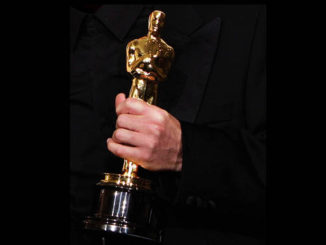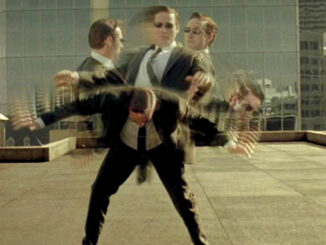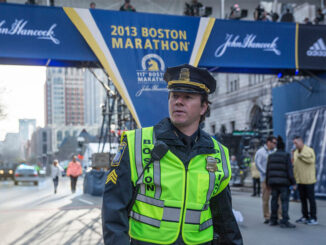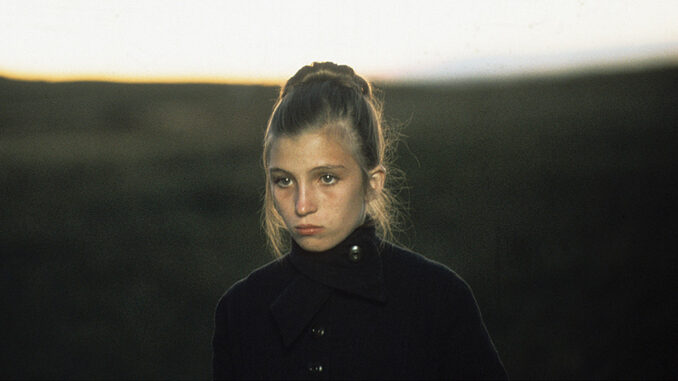
by Ned Bastille, ACE
October 1978. A weekday afternoon in Manhattan. I stumble into daylight, having just experienced something which has so floored me that I’m numb, twisted around, and can’t remember which subway takes me back downtown — so I start walking, trying to make sense of what I’d just seen.
“Nobody’s perfect. There was never a perfect person around. You just got half devil and half angel in you.”
New York wasn’t easy for me. After attending film school in Rhode Island, I’d moved to the city full of hopes and dreams — but also apprehension, as I was a newcomer and didn’t know anyone in the business. It was a tough time of acclimating to urban life and scratching out gigs as a production assistant.
I usually worked as a runner on commercials. One for a bra company was titled: “Doctor, Please!” During lulls, I sometimes worked for a caterer; I recall bartending at a party honoring Lillian Hellman when Walter Cronkite walked up and asked for a scotch and soda. He sounded exactly like Walter Cronkite.
Earlier that sweltering summer I worked briefly on the production of the feature The Warriors (1979) doing crowd control on a few memorable all-nighters in the then-sketchy neighborhood of Bedford-Stuyvesant. But doubts over my non-career and money worries kept me on a low simmer of anxiety. Several times I nearly bailed out of New York to retreat to calm, familiar Providence, but I knew that would be a move I’d ultimately regret.
When the phone started collecting cobwebs and things got especially dire, I’d head for the forgiving darkness of the cinema, usually in the afternoons. One such day I noticed an ad for a new movie which featured some frowning individuals in period costumes reclining on an Andrew Wyeth-esque field of grass. Something about the title hooked me; I went.
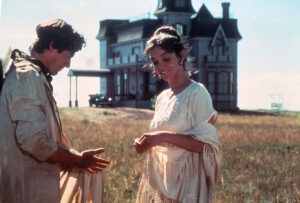
Then, as now, I prefer to watch films without any knowledge of the premise or a review (why do so many reviews insist on giving away large parts of the plot?), so I headed uptown to the Beekman Theatre and sat with perhaps five other audience members for a matinee, having no idea of what awaited me in Terrence Malick’s Days of Heaven.
“We heard owls squawking away, moving away. We didn’t know where we were going, what we were going to do.”
From the start, the film unfolds in an elegant on-screen dream. Environments, characters and dramatic situations are encountered with little or no explanation. We catch snippets of dialogue, overhear inconsequential asides. Changes of time and location leave the viewer questioning and wanting more.
It’s an impressionistic masterpiece which shares the genetics of a documentary with those of a narrative film. The cinematography by Néstor Almendros, ASC (and Haskell Wexler, ASC) is stunning; Ennio Morricone’s plaintive score enhances the mood perfectly. There are moments in Days of Heaven that achieve a near-operatic quality in the synthesis of sound, picture and pacing (the antithesis of more common storytelling tendencies in which seemingly every moment and motivation must be clearly spelled out with wedged-in chunks of expository ADR or percussive sound effects to “make it land”).
And then there’s that unexpected but completely appropriate narration by actress Linda Manz, delivered in a city-dweller’s accent:
“Some sights that I saw was really spooky that it gave me goose pimples. That felt like cold hands touching the back of my neck, and — and it could have been the dead coming for me or something.”
When I left the theatre that afternoon, I knew I’d been changed. Here was the kind of storytelling that respected the intelligence of its audience, that understood the power of juxtaposed image and audio, and that wholeheartedly embraced the lovely concept that movies are our dreams.
Like nearly any other film, the charms of Days of Heaven were lost on many. A friend deemed it fraudulent, a victory of style over substance. I’ve heard the same critique from others and, while I understand these complaints, for me they don’t apply; the film’s unique storytelling method is so hypnotic and evocative.
At the time, I guessed correctly that the film had indeed been completely reworked, but that fact thrilled me. To write and shoot an entire film, then have the ability (let alone courage) to implement an entirely new film from your existing footage? Very impressive. This victory of style and substance had been discovered in the cutting room in a year-long collaboration between Malick and his talented and groundbreaking editor, Billy Weber.
This was the kind of editing that I wanted to do.
I went back to my little apartment that day, reinvigorated and grateful. I would watch Days of Heaven many times over the years. It continues to inspire me and my editing. I still believe in discovering the hidden potential within the footage and in the simple power of impressionistic images, sounds and dreams.


